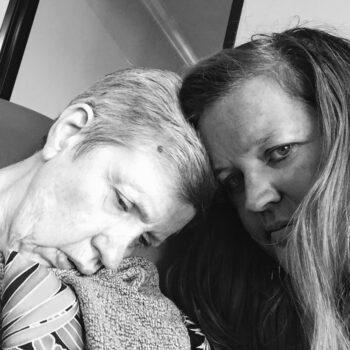Miki Klocke

The reality of a caregiver’s situation is not talked about enough. During my 17 years as Mom’s caregiver, I was often told to “take care of yourself first.” This advice seemed like a cruel joke, and I still dislike how the term “self-care” is currently defined. While those outside of this experience may believe this advice sounds comforting, it’s also hard to implement.
February 19th, 2018
Miki Klocke is a fused glass artist and photographer who lost her Mom, Jan, to Alzheimer’s, after caring for her for 17 years. Her book, Alzheimer’s: Beyond Caregiving, focuses on the “tribe of caregivers” she met while caring for her Mom, and redefining self-care.
My Mom, Jan, was diagnosed with Alzheimer’s when she was 56 years old and still working two jobs. I was 33 and became her full-time caregiver. Before her diagnosis, I had been working a full-time job, but all of the dreams my Mom and I had for our future were halted.
During my 17 years as Mom’s caregiver, I was often told to “take care of yourself first.” This suggestion seemed like a cruel joke, and I still dislike how the term “self-care” is currently defined. While those outside of this experience may believe this advice sounds comforting, it’s hard to implement. The reality of a caregiver’s situation is not talked about enough. When you are caring for a loved one 24/7, you wonder, “How do I even give myself 15 minutes of self-care?”. There are a lot of stigmas attached to this disease, and until people become more aware of a caregiver’s reality, these stigmas will remain.
Although there are resources available to help with finding respite care, there often wasn’t time to seek them out while I tried to manage this experience on my own. There was no time for luxuries such as 30-minute walks, and I beat myself up for not being able to engage in the one process everyone says is so important: self-care. However, over time, I realized that self-care does not have to include physical actions such as meeting a friend for coffee; self-care can also be a mindset.
While writing a book about my experience, I discovered that although there may be little time for yourself, you can still get help from other caregivers and friends you make in support groups. When my Mom was diagnosed, there wasn’t a large online community to reach out to, but there was an Alzheimer’s Association near me that provided me with resources for financial and medical planning. I was also lucky to grow up in a small town that offers support groups for seniors and their relatives. While resources are available through hospitals, hospice and other senior services, they’re not necessarily easy to find. Asking for help takes courage, but eventually, I found that interacting with other caregivers is a great way to discover these resources. While an online community is valuable, face-to-face conversations with caregivers are important.
By sharing stories, challenges and successes with other caregivers, I learned several lessons: What worked yesterday may not work the next day, it is important to plan ahead, while also being flexible, and becoming OK with change is a form of self-care. While I still find it difficult to view day-to-day luxuries as a form of self-care, I think understanding that control is often an illusion is a form of self-care in itself.